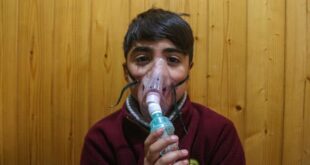Several key COVID-19 trends that authorities track are now accelerating around the country, the Centers for Disease Control and Prevention announced Friday. It’s the first major nationwide uptick in the spread of the virus seen in months.
The largest increases are in the Midwest and the Mid-Atlantic, the agency said in its weekly report updated Friday, though virtually all regions of the country are now seeing accelerations.
Data reported by the agency from emergency rooms and wastewater sampling have tracked some of the steepest increases so far this season in the region spanning Illinois, Indiana, Michigan, Minnesota, Ohio and Wisconsin.
Rates of infections of nursing home residents across this Midwestern region have also soared in recent weeks, higher than in most other parts of the country, approaching levels not seen since the peak of last winter’s COVID-19 wave.
“Remember we had a late summer wave of COVID. We came down from that. We are going back up again, which we expect again, after a lot of travel and gathering at Thanksgiving,” CDC Director Dr. Mandy Cohen said Thursday at a House committee hearing.
Close to 2 million Americans are now living in counties deemed to have “high” levels of COVID-19 hospitalizations, where the CDC urges masking in public and other precautions to curb the threat posed by the virus.
Around 1 in 10 Americans are now in communities with “medium” levels of hospitalizations, where the agency counsels some additional precautions for at-risk Americans.
Cohen said the agency has also been tracking other respiratory illnesses accelerating in recent weeks ahead of COVID-19’s rise, in line with previous fall and winter virus seasons.
/ Getty Images
Respiratory syncytial virus, or RSV, is now “near peak” in many southern states that first saw cases and hospitalizations rise in young children earlier this year.
In an updated report this week, the CDC’s disease forecasters said RSV hospitalizations were at levels worse than pre-pandemic seasons, but likely on track to reach a “lower and later peak” than last year.
Flu trends have also been accelerating nationwide, the agency said, with more expected increases into December. However, data from emergency rooms suggest influenza has yet to eclipse COVID-19 levels overall.
“Even though those are both going up and we’re at the peak of RSV, COVID is still the respiratory virus that is putting the most number of folks in the hospital and taking their lives,” said Cohen.
Officials say they have also been keeping tabs on reports of other causes of pneumonia-like illness in kids this year, like the common mycoplasma bacteria that has shared the blame for China’s recent surge in pediatric hospitalizations. Health authorities have also reported seeing mycoplasma pneumonia in the mix among cases of sick children in Ohio.
Several countries abroad have also seen steeper increases of the bacterial infections in kids this season, which experts said had largely disappeared around the world during the COVID-19 pandemic. Denmark recently warned it was reaching epidemic levels of mycoplasma.
Cohen said Friday in a briefing with reporters that U.S. trends suggested respiratory illnesses in children were not “atypical” so far.
Health officials in Ohio had also not seen unusual strain on their hospitals, she said, and most children in the outbreaks were “recovering at home.”
“We are seeing COVID and flu and RSV as well as some pneumonia, but nothing outside the typical of what we would see,” Cohen said, citing data analyzed by the agency from testing laboratories and emergency rooms around the country.
Weekly counts of emergency room visits for influenza — which, in a CDC study before the pandemic, had ranked among the most common causes of pneumonia – have surged among school-age kids nationwide in recent months.
In the opposite of what is seen in adults, rates of influenza in emergency room visits for children remain multiple times higher than for COVID-19.
“At this time, what we are seeing is quite typical of this moment in the winter respiratory virus season,” Cohen said.

 Latest Breaking News Online News Portal
Latest Breaking News Online News Portal





